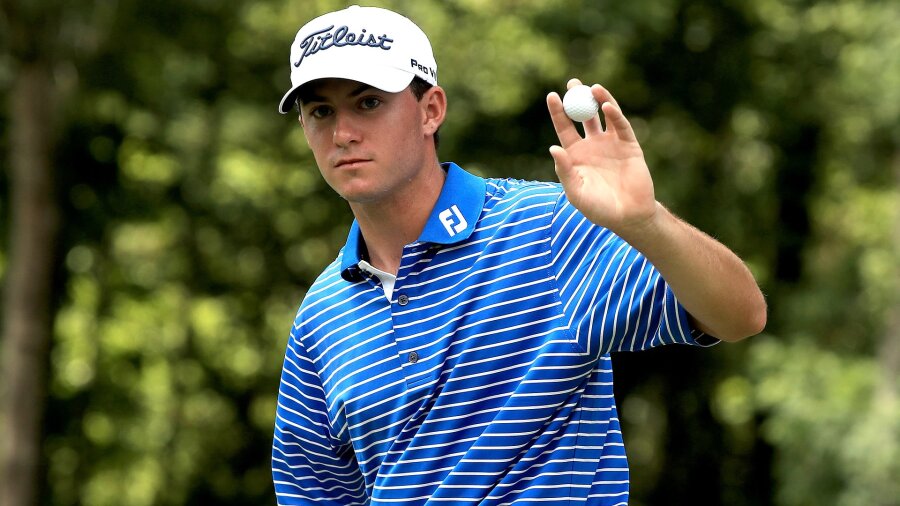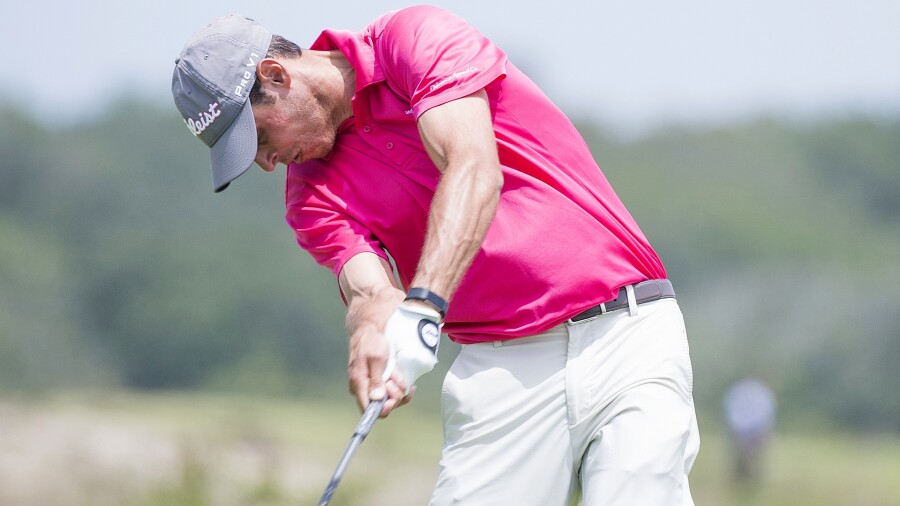They all have stories.
Tales about the time that they went toe to toe with a future major champ, or maybe even clipped him by a shot. Memories of walking the range just a few short years ago and viewing some of golf’s brightest stars simply as peers.
The Class of 2011 continues to expand its collective footprint on the national stage, but it extends beyond names like Jordan Spieth and Justin Thomas. In almost every field at every level of professional golf, there are players from that prodigious class, each still straddling the divide between memories of the past and dreams for the future.
Once junior competitors, they are now young men entrenched in their mid-20s. And while some of their former classmates have already piled up long lists of achievements, dozens more are still fighting for status on the various echelons of golf’s meritocracy.
Their common goal remains a simple one: join former classmates on the big stage as soon as possible.
Michael Johnson at the 2016 Barbasol Championship (Getty Images)
Michael Johnson gets asked about it a couple times per year.
When The Players Championship rolls around in mid-May, his phone lights up with calls or texts about the time that he topped an elite field on the Stadium Course at TPC Sawgrass.
It was the 2010 AJGA Junior Players Championship, and its leaderboard could pass for a current-day PGA Tour event. Spieth was a runner-up alongside Emiliano Grillo, while Patrick Rodgers was seventh. Daniel Berger and Ollie Schniederjans tied for eighth.
But the man with the trophy was Johnson, who also ended up sixth in the final AJGA/Polo recruiting rankings for the Class of 2011 – ahead of the likes of Grillo, Berger and Schniederjans.
“Obviously that Junior Players is something I look back on, and it puts a smile on my face,” Johnson said.
He went on to have a successful career at Auburn, including first-team All-American honors his senior year. A hip injury led to a redshirt season and dropped him a year behind his classmates, but he graduated in the summer of 2016 and quickly turned pro.
| MORE ON THE Class of 2011 |
|---|
| Lavner: Origins of the Class |
| Hoggard: Who’s got next? |
| Gray: The struggle is real |
| Baggs: Other great ‘groups’ |
| Photos: The AJGA days |
Johnson’s PGA Tour debut revealed just how thin the margin can be between the fast track to stardom and a more arduous battle. Playing on a sponsor invite at the Barbasol Championship, he finished third.
Officials told him that based on the non-member FedExCup points he earned, Johnson could expect a spot in the Web.com Tour Finals that fall and a chance to play for a PGA Tour card. At worst, he’d lock up Web.com status for 2017.
But the numbers didn’t pan out as expected, and even after Monday qualifying for the season-ending Wyndham Championship, Johnson knew he had work to do. But he missed the cut by a shot.
With the top 200 in points qualifying for the Finals, Johnson finished 201st.
“It was pretty tough, honestly,” he said. “I was on such a high that whole summer and came crashing down pretty quickly.”
Instead of a shot at the PGA Tour, Johnson tumbled all the way down to the ground floor: the first stage of Web.com Tour Q-School.
“It was kind of funny,” he said. “I’d be on the range and my friends would be like, ‘Why are you here?’ I’d be like, ‘Well, I’ve got to go through Q-School, just the same as you.’”
Johnson played his way up, one level at a time, before ultimately earning his Web.com card for 2017 and retaining it for the upcoming season. This fall he watched on TV as several of the players he beat that memorable week at TPC Sawgrass competed at the Presidents Cup.
Johnson still awaits his next opportunity, and the confidence that he’ll soon join former classmates on a full-time basis hasn’t wavered.
“I would say that people, they don’t know how hard it is,” Johnson said. “People are just confused, thinking golf is just a recreational sport and you’re out there having fun. But it’s just like any other sport in that it’s so hard to get into the big leagues.”
Morgan Hoffmann, Brooks Koepka, Jordan Spieth and Byron Meth at the 2015 Masters (Getty Images)
For Byron Meth, the questions always trace back to the 2015 Masters.
That’s when the winner of the final U.S. Amateur Public Links Championship made his Augusta National debut. As he soaked in the azaleas, Meth asked to join Morgan Hoffmann for a Tuesday practice round. Hoffmann told him simply to turn up to the 10th tee to see who they were facing.
Their opponents for the day turned out to be Spieth and Brooks Koepka.
“It was a little reminiscent of our AJGA days, but more so our college practice rounds,” Meth recalled. “We were just hitting shots and telling stories. Just kind of hung out and embraced the day.”
Five days later, Meth watched the kid from Texas he had known for years slip into a green jacket. Inevitably, reporters wanted to know what sort of spark he had seen from Spieth in their practice round together.
“Jordan didn’t look any different that day than he did when we were kids,” Meth explained. “But the confidence was definitely way higher because of his success.”
Growing up in Southern California, Meth’s duels with reigning PGA Tour Rookie of the Year Xander Schauffele date back to their high school days. Meth was 26th in the final recruiting rankings, one spot ahead of current PGA Tour player C.T. Pan, and it was qualifying for the Masters that convinced Meth that his game was strong enough to compete on an elite level.
That belief was quickly reinforced in his first event as a pro, a pre-qualifier for the 2016 Sony Open. He advanced, then went on to Monday qualify for the main event.
It was success beyond anything that he could have anticipated, but it’s a result that now elicits a sigh.
“It kind of sounds strange, but Monday-ing into the Sony might have been one of the worst things that happened to me in 2016,” he said. “I made the mistake of having expectations. I thought it was going to happen like that all the time.”
As many other pros can attest, easy success is either fleeting or entirely non-existent. Meth quickly learned that lesson, and like Johnson became the victim of razor-thin margins. He missed the cut in the first stage of Web.com Q-School by a shot last year, and fell short by the same number this year. In between, he spent his months toiling on the Mackenzie Tour in Canada and now faces a similarly uncertain future in the spring.
The rigors of Q-School do not show favor to former major participants, nor do they offer midseason reprieves for those who fail to advance. Meth is back to the drawing board, fully aware of the uphill battle that awaits.
But he remains imbued with confidence from his week at Augusta National, a brief stint alongside the game’s best where he had a front-row seat for the pinnacle of Spieth’s career.
“I asked him that day, ‘It doesn’t look like you’re doing anything different physically than you did when we were kids,’” Meth said. “He goes, ‘I just had an opportunity to play, and I took advantage of it.’”
Joseph Winslow competing on the 2017 Latinoamerica Tour (Getty Images)
As one of the top junior golfers in the Kansas City area, Joseph Winslow had a keen eye for other Midwest names on the leaderboard. One, in particular, continued to stand out.
“I would look at the standings and saw this kid from Avon, Indiana,” Winslow said. “And I was just wondering like, ‘What’s his deal? Why is he winning, what’s he doing?’”
That kid turned out to be Rodgers, who went on to a decorated career at Stanford and has won more than $4 million on Tour. As the No. 18 recruit in the Class of 2011, according to AJGA/Polo rankings, Winslow saw plenty of Rodgers growing up. But he also ventured south to challenge elite fields that featured Spieth, Thomas and Grillo.
“I think if you look at the invitationals from late 2010 into 2011, those were probably some of the strongest fields ever in AJGA, junior golf history, when you look at current players today,” Winslow said.
He committed to Iowa, and as freshman tied for 13th alongside Rodgers at the 2012 NCAAs. Days later, Spieth edged Thomas in a memorable match at Riviera while helping Texas win a team national title.
The chilly winter weather led him to transfer to the University of South Florida, and Winslow’s first move after turning pro was to qualify for the Asian Tour. But the status he earned didn’t make the extensive travel worthwhile, so he opted to spend his first summer scratching out checks closer to home on the Adams Pro Tour.
“It was a little bit of culture shock starting out, turning up to golf courses and seeing greens with weeds on them,” he said. “Just stuff that you’ve never experienced before, and that’s part of the life.”
This year Winslow gained a foothold with status on PGA Tour LatinoAmerica, and he’s been giving his passport a workout ever since. A pro for less than three years, he estimates that he’s already teed it up in 21 different countries in search of a path that will earn him another tee time next to Rodgers.
“My goal is to be out there on the PGA Tour, playing with the guys I’ve been playing with my whole life,” he said. “We’re just working our way back up, putting in the time that you have to, and take advantage of your opportunities when you get them.”
Stephen Behr at the 2017 Amateur Championship. (courtesy: Stephen Behr)
Stephen Behr knew that the sound was just different.
It was at the 2010 AJGA Polo Golf Classic that Behr, No. 11 in the Class of 2011, looked around him on the driving range and found all the usual suspects: Spieth, Thomas, Grillo, Schniederjans.
“Berger wasn’t even that good back then,” Behr recalled. “And now he’s a stud.”
Going through his own warm-up routine, Behr took in the sights. But he listened even more intently, focusing on the sounds of future major champions making crisp contact each and every time. Whoosh. Whoosh.
And it was the sound that gave him pause, even at age 17.
“It was just like, it almost made you feel bad about your game,” he said. “You’d watch them hit it and it was like, I’ve got training wheels on and they’re in Ferraris.”
That realization is a big reason why Behr, an accomplished player who earned All-American honors during his senior year at Clemson, now works as a risk consultant with Ernst & Young. His battles with the stars from his graduating class are now entirely in the rear-view mirror, a wistful recollection of time spent in the arena.
“I don’t think I ever beat Spieth,” he said. “I think my record against him is like 0-52. I never beat him because his off weeks, I feel like he still finished third.”
While Behr didn’t turn pro after graduation, his clubs aren’t exactly collecting dust. His amateur ranking based on his final days at Clemson was good enough to gain entry into the British Amateur this summer, and these days the self-described “weekend warrior” carries a plus-3.2 handicap.
“I can still get it around, man,” Behr said. “I’m just not quite as sharp as I used to be.”
Behr excelled both in the classroom and on the course at Clemson. Afforded the option of a promising gig in finance with ample on-course networking opportunities, he happily headed for corporate America while some of his former peers were busy racking up trophies.
“A lot of people, when I tell them that I played with those guys, they think that maybe I just played like in one tournament against them,” he said. “But like, no. I actually played in the same group with them, and competed with them.”
Behr explained that while his time against such top-tier talent created great memories, it also affected his career choice. Perhaps, he admitted, he might have tried the pro golf circuit had he been a member of the Class of 2010 or 2012.
Instead, he was constantly flanked on the range by Ferraris.
Behr still plans to remain active in amateur golf, and next year will take his first crack at the U.S. Mid-Amateur. A win there would earn him a spot in two majors, and perhaps a chance to improve his record against Spieth.
Until then, he’s able to reflect fondly from an office chair on memorable days gone by.
“I’m glad I got into those AJGAs and got to compete against them, and see first-hand how impressive they were,” he said. “I think this 2011 class, I’ll look back when I’m a granddad and be telling my grandkids about some of these guys that I got to play with.”







